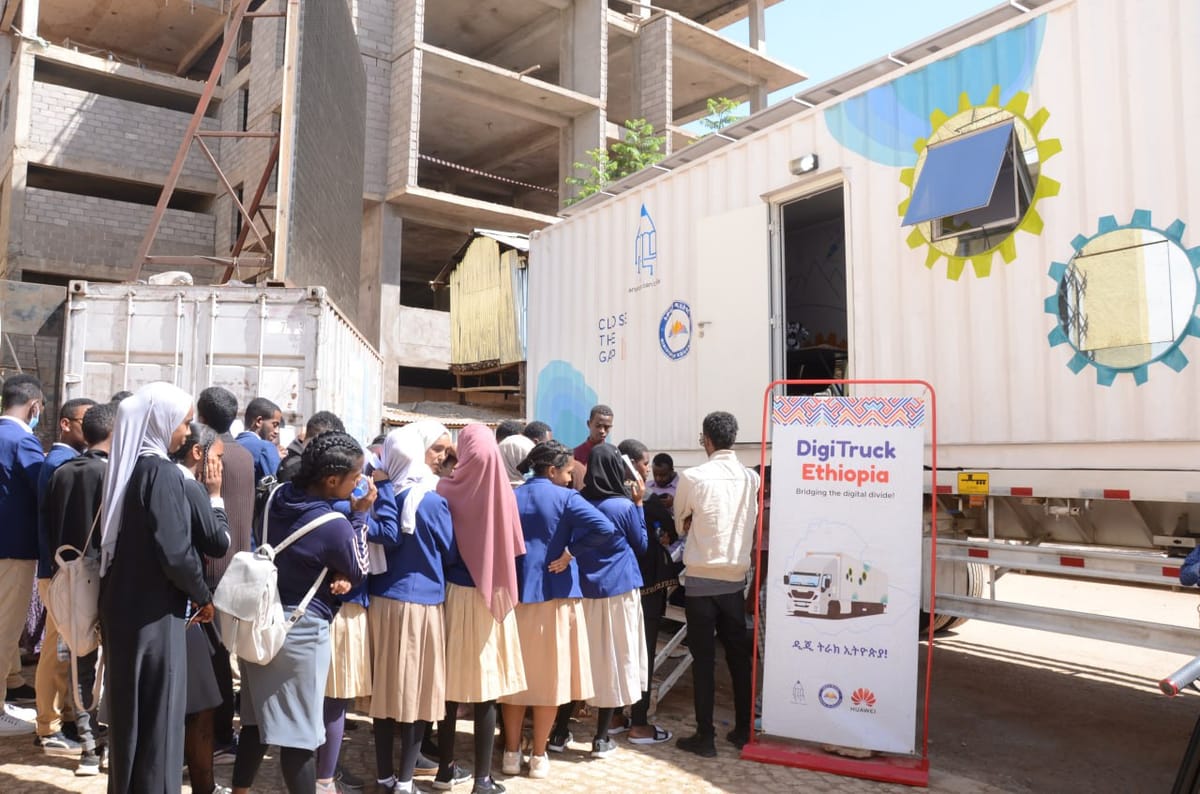The journey of DigiTruck Ethiopia

Ethiopia faced a significant literacy challenge in 2017, with only 51.8% of people aged 15 and above considered literate. This issue was particularly concerning when it came to gender disparity, as only 44.4% of females were considered literate. In recognition of the essential role of digital preparedness in Ethiopia's future, the Digital Ethiopia 2025 Strategy highlights the need to go beyond basic literacy and focus on fostering digital literacy nationwide. This is especially important in rural areas which make up 80% of the population.
Even though 70% of students join STEM/Natural science fields, the delivery of this education is deterring students from venturing into unfamiliar areas. Outdated educational approaches contribute to a need for more professionals, particularly in STEM. The educational system's theoretical focus leaves students needing more hands-on experience, hindering their skill development. Additionally, tech initiatives are predominantly concentrated in the capital, leaving regional cities underserved, while dysfunctional school ICT labs widen the divide.
DigiTruck Ethiopia is an innovative initiative that seeks to empower students with practical tech education tailored to the demands of the 21st century. The primary objective of this initiative is to ignite a spark in students' minds about the possibility of the world of technology by providing them with basic technology literacy for free. The program stands out due to its innovative off-the-grid mobile truck concept (40ft refurbished container and truck),enabling it to reach remote communities and ensure students in marginalized areas benefit from hands-on learning experiences that transcend geographical barriers.
The infrastructure is fully equipped with laptops, devices, robots, and microcontrollers, allowing students to develop digital skills through practical application. The curricula and training materials are thoughtfully tailored to students who have yet to gain prior experience using a computer. While the trainers in the DigiTruck facilitate the training, the training materials are designed by adding local languages and characters for familiarity to achieve a smoother learning curve and ensure students acquire practical skills and grasp the underlying concepts. The emphasis on languages in curriculum development is essential to DigiTruck Ethiopia's commitment to effective education. The focus on standardizing training delivery ensures quality and that students understand concepts and feel a cultural resonance, facilitating a deeper understanding and connection to the material.
In partnership with the FDRE Ministry of Education and Huawei Technologies Ethiopia, iCog Anyone Can Code, DigiTruck Ethiopia has impacted over 1900 young adults in seven cities across Ethiopia. Importing infrastructure for a project of this nature posed significant challenges with relentless procedures. Our strategic approach to overcoming this hurdle involved seeking the right partnerships, underscoring the importance of such alliances in the success of initiatives like ours.
With these strategic partnerships and collaborations, we were able to leverage more connections, expedite the procedure, and get the appropriate support for the implementation. Engaging stakeholders, including regional education bureaus, education offices, and universities, facilitated the execution of this initiative. We involved institutions and engaged with iCog Anyone Can Code's alum network from different projects and regions to further the facilitation and improve reach.
DigiTruck Ethiopia is a testimony of multi-stakeholder partnerships and regional integration. Thanks to these collaborations, along with the formulation of effective implementation strategies and a dedicated team, we have embarked on a journey to empower students, decentralize tech education, and actively contribute to the advancement and flourishing of the bright minds of Ethiopia.
Written by: Rebecca Surafel and Paulos Birhanu.
